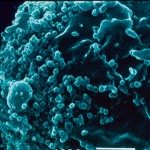Lien vers Pubmed [PMID] – 16796744
Retrovirology 2006 Jun;3:36
BACKGROUND: The placenta plays an important role in the control of in utero HIV-1 mother-to-child transmission (MTCT). Proinflammatory cytokines in the placental environment are particularly implicated in this control. We thus investigated the effect of TNF-alpha on HIV-1 expression in human placental tissues in vitro.
RESULTS: Human placental chorionic villi fragments were infected with varying doses of luciferase reporter HIV-1 pseudotypes with the R5, X4-Env or the vesicular stomatitis virus protein G (VSV-G). Histocultures were then performed in the presence or absence of recombinant human TNF-alpha. Luciferase activity was measured at different time points in cell lysates or on whole fragments using ex vivo imaging systems.A significant increase in viral expression was detected in placental fragments infected with 0.2 ng of p24 antigen/fragment (P = 0.002) of VSV-G pseudotyped HIV-1 in the presence of TNF-alpha seen after 120 hours of culture. A time independent significant increase of viral expression by TNF-alpha was observed with higher doses of VSV-G pseudotyped HIV-1. When placental fragments were infected with R5-Env pseudotyped HIV-1, a low level of HIV expression at 168 hours of culture was detected for 3 of the 5 placentas tested, with no statistically significant enhancement by TNF-alpha. Infection with X4-Env pseudotyped HIV-1 did not lead to any detectable luciferase activity at any time point in the absence or in the presence of TNF-alpha.
CONCLUSION: TNF-alpha in the placental environment increases HIV-1 expression and could facilitate MTCT of HIV-1, particularly in an inflammatory context.

